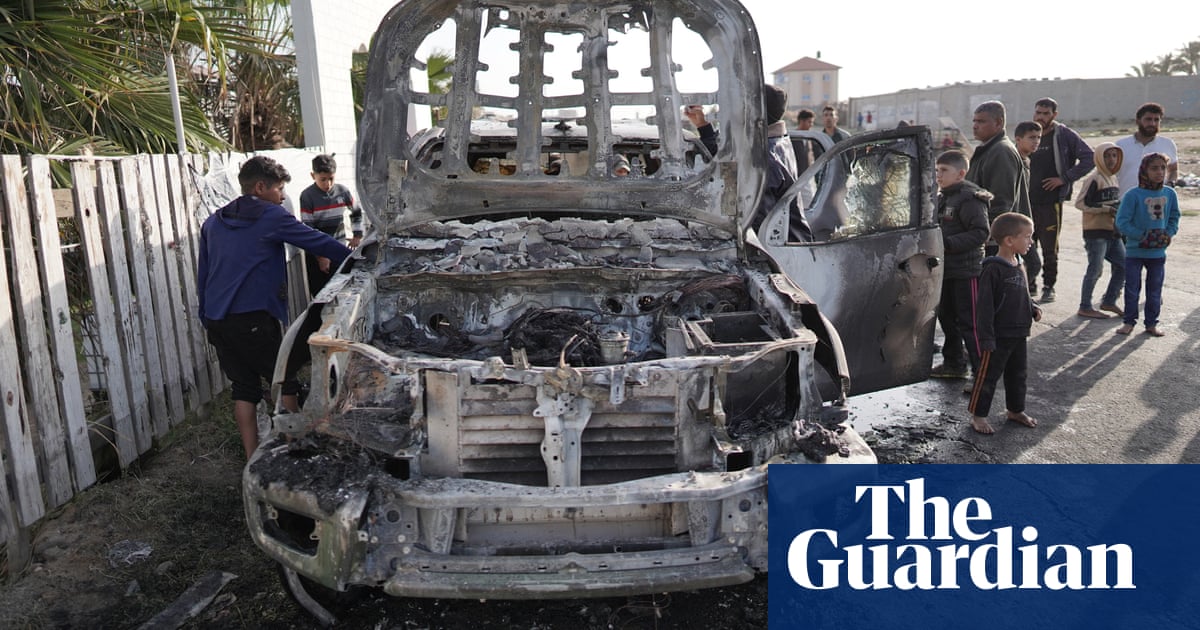Ministers are under pressure from Tory MPs and peers to stop arming Israel after seven humanitarian workers were killed by an airstrike in Gaza.
Four Conservatives told the Guardian on Wednesday that the UK should stop exporting arms to Israel after its strike, which killed three British aid workers.
Their intervention comes after Peter Ricketts, a government national security adviser during David Cameron’s premiership, said the time had come to send a signal and stop exporting arms. David Jones, the Conservative MP for Clwyd West, said the Israeli strike on the aid convoy was “extraordinary”.
“The government should urgently reassess its supply of arms and deliver a stern warning to Israel about its conduct. Israel has every right to defend itself and every right to act proportionately – that doesn’t include people who are trying to do good,” he said.
“Given that we’ve seen three British citizens – all of them ex-forces – killed in what is, at best, a negligent manner I think that we really need to reassess our supply of weaponry there.
“I thought that [Benjamin] Netanyahu’s response – ‘these things happen in war’ – was completely inadequate, frankly shamefully inadequate.”
Paul Bristow, the Conservative MP for Peterborough, said: “The thought that British-made arms could be used in action that kills innocent civilians in Gaza turns the stomach. The fact that we have now seen British aid workers killed while they try to feed families in Gaza must be a line in the sand.”
Flick Drummond, the Conservative MP for Meon Valley, said UK arms sales to Israel should be stopped “for the foreseeable future”. “This has been concerning me for some time,” she said. “What worries me is the prospect of UK arms being used in Israel’s actions in Gaza, which I believe have broken international law.”
Hugo Swire, a former Foreign Office minister in Cameron’s government, said: “I fully support the UK policy of selling arms to Israel in order for Israel to be able to defend herself from any would-be aggressor. What I do not support is the selling of arms which can be – and now look as if they are being – used offensively in Gaza.”
Alan Duncan, another former Foreign Office minister, told the charity Action for Humanity that “the government’s stance on arms exports to Israel is a matter of grave concern, particularly given Israel’s blatant disregard for international humanitarian law.”
He called for an immediate arms embargo and immediate clarifications of whether UK components were used in the strike that killed the aid workers.
The Liberal Democrats called on Wednesday morning for UK arms exports to Israel to be suspended. The SNP said parliament should be recalled from its Easter recess to discuss the crisis.
Rishi Sunak told the Sun’s Never Mind the Ballots show on Wednesday night that Israel’s conduct in Gaza had become “increasingly intolerable”. The prime minister said arms licences were kept under careful review according to “regulations and procedures that we’ll always follow”.
Lord Ricketts, who is also a former permanent secretary of the Foreign Office, told BBC Radio 4’s Today programme: “I think there’s abundant evidence now that Israel hasn’t been taking enough care to fulfil its obligations on the safety of civilians. And a country that gets arms from the UK has to comply with international humanitarian law. That’s a condition of the arms export licence. So honestly, I think the time has come to send that signal.
“It won’t change the course of the war. It would be a powerful political message. And it might just stimulate debate in the US as well, which would be the real game-changer.”
The challenges for Labour to maintain a united front on the issue were apparent on Wednesday at a joint appearance in London by the shadow chancellor, Rachel Reeves, and the London mayor, Sadiq Khan, where the latter said there was now “a case” for halting arms sales.
“If the government legal advice says what people suspect it says, then the government should be halting sales,” Khan said.
Asked if she agreed, Reeves reiterated the party line that Labour was urging the government to publish any reports that it had on Israel’s compliance with international law.
In a statement on Wednesday afternoon, David Lammy, the shadow foreign secretary, said that if the government’s legal advice “says there is a clear risk that UK arms might be used in a serious breach of international humanitarian law, it’s time to suspend the sale of those arms.”
The seven aid workers, who had been delivering food aid to Gaza, were killed on M0nday by an Israeli drone. Those killed – three British citizens, a Palestinian, a US-Canadian dual citizen, a Pole and an Australian – were working for World Central Kitchen (WCK), an international charity.
Rishi Sunak has called for an urgent investigation into the Israeli airstrike.
The seven victims were named by WCK as Britons John Chapman, 57, James Henderson, 33, and James Kirby, 47, who were working for the charity’s security team. The team’s leader, Zomi Frankcom, 43, an Australian national, also died, along with Jacob Flickinger, 33, an American-Canadian dual citizen; Damian Sobol, 35, a Polish national; and Saif Issam Abu Taha, a 25-year-old Palestinian.
On Tuesday the Israeli newspaper Haaretz published details of the strike, citing defence sources. According to the report, an Israeli drone fired three missiles at the convoy of three armoured cars – all of which were clearly marked on the roof and sides with the WCK’s logo – because of a suspicion that an armed militant was travelling with them.
Despite the fact that the suspect did not leave a warehouse with the rest of the group, the cars were hit as they travelled back along a route pre-approved and coordinated with the Israel Defense Forces (IDF), the report said.
Lt Gen Herzi Halevi, the chief of the general staff of the IDF, said the incident was “a mistake that followed a misidentification –during a war in very complex conditions. It shouldn’t have happened”.











